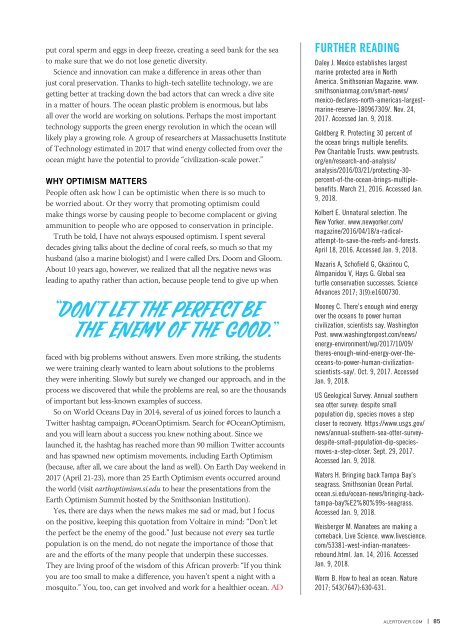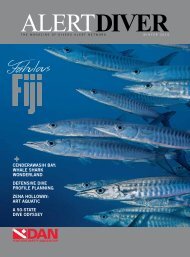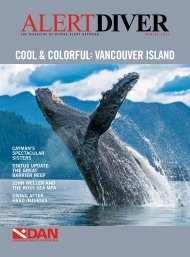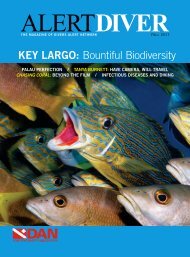AD 2018 Q1
Alert Diver is the dive industry’s leading publication. Featuring DAN’s core content of dive safety, research, education and medical information, each issue is a must-read reference, archived and shared by passionate scuba enthusiasts. In addition, Alert Diver showcases fascinating dive destinations and marine environmental topics through images from the world’s greatest underwater photographers and stories from the most experienced and eloquent dive journalists in the business.
Alert Diver is the dive industry’s leading publication. Featuring DAN’s core content of dive safety, research, education and medical information, each issue is a must-read reference, archived and shared by passionate scuba enthusiasts. In addition, Alert Diver showcases fascinating dive destinations and marine environmental topics through images from the world’s greatest underwater photographers and stories from the most experienced and eloquent dive journalists in the business.
Create successful ePaper yourself
Turn your PDF publications into a flip-book with our unique Google optimized e-Paper software.
put coral sperm and eggs in deep freeze, creating a seed bank for the sea<br />
to make sure that we do not lose genetic diversity.<br />
Science and innovation can make a difference in areas other than<br />
just coral preservation. Thanks to high-tech satellite technology, we are<br />
getting better at tracking down the bad actors that can wreck a dive site<br />
in a matter of hours. The ocean plastic problem is enormous, but labs<br />
all over the world are working on solutions. Perhaps the most important<br />
technology supports the green energy revolution in which the ocean will<br />
likely play a growing role. A group of researchers at Massachusetts Institute<br />
of Technology estimated in 2017 that wind energy collected from over the<br />
ocean might have the potential to provide “civilization-scale power.”<br />
WHY OPTIMISM MATTERS<br />
People often ask how I can be optimistic when there is so much to<br />
be worried about. Or they worry that promoting optimism could<br />
make things worse by causing people to become complacent or giving<br />
ammunition to people who are opposed to conservation in principle.<br />
Truth be told, I have not always espoused optimism. I spent several<br />
decades giving talks about the decline of coral reefs, so much so that my<br />
husband (also a marine biologist) and I were called Drs. Doom and Gloom.<br />
About 10 years ago, however, we realized that all the negative news was<br />
leading to apathy rather than action, because people tend to give up when<br />
“DON’ T LE T THE PERFECT BE<br />
THE ENEM Y OF THE GOOD.”<br />
faced with big problems without answers. Even more striking, the students<br />
we were training clearly wanted to learn about solutions to the problems<br />
they were inheriting. Slowly but surely we changed our approach, and in the<br />
process we discovered that while the problems are real, so are the thousands<br />
of important but less-known examples of success.<br />
So on World Oceans Day in 2014, several of us joined forces to launch a<br />
Twitter hashtag campaign, #OceanOptimism. Search for #OceanOptimism,<br />
and you will learn about a success you knew nothing about. Since we<br />
launched it, the hashtag has reached more than 90 million Twitter accounts<br />
and has spawned new optimism movements, including Earth Optimism<br />
(because, after all, we care about the land as well). On Earth Day weekend in<br />
2017 (April 21-23), more than 25 Earth Optimism events occurred around<br />
the world (visit earthoptimism.si.edu to hear the presentations from the<br />
Earth Optimism Summit hosted by the Smithsonian Institution).<br />
Yes, there are days when the news makes me sad or mad, but I focus<br />
on the positive, keeping this quotation from Voltaire in mind: “Don’t let<br />
the perfect be the enemy of the good.” Just because not every sea turtle<br />
population is on the mend, do not negate the importance of those that<br />
are and the efforts of the many people that underpin these successes.<br />
They are living proof of the wisdom of this African proverb: “If you think<br />
you are too small to make a difference, you haven’t spent a night with a<br />
mosquito.” You, too, can get involved and work for a healthier ocean. <strong>AD</strong><br />
FURTHER RE<strong>AD</strong>ING<br />
Daley J. Mexico establishes largest<br />
marine protected area in North<br />
America. Smithsonian Magazine. www.<br />
smithsonianmag.com/smart-news/<br />
mexico-declares-north-americas-largestmarine-reserve-180967309/.<br />
Nov. 24,<br />
2017. Accessed Jan. 9, <strong>2018</strong>.<br />
Goldberg R. Protecting 30 percent of<br />
the ocean brings multiple benefits.<br />
Pew Charitable Trusts. www.pewtrusts.<br />
org/en/research-and-analysis/<br />
analysis/2016/03/21/protecting-30-<br />
percent-of-the-ocean-brings-multiplebenefits.<br />
March 21, 2016. Accessed Jan.<br />
9, <strong>2018</strong>.<br />
Kolbert E. Unnatural selection. The<br />
New Yorker. www.newyorker.com/<br />
magazine/2016/04/18/a-radicalattempt-to-save-the-reefs-and-forests.<br />
April 18, 2016. Accessed Jan. 9, <strong>2018</strong>.<br />
Mazaris A, Schofield G, Gkazinou C,<br />
Almpanidou V, Hays G. Global sea<br />
turtle conservation successes. Science<br />
Advances 2017; 3(9):e1600730.<br />
Mooney C. There’s enough wind energy<br />
over the oceans to power human<br />
civilization, scientists say. Washington<br />
Post. www.washingtonpost.com/news/<br />
energy-environment/wp/2017/10/09/<br />
theres-enough-wind-energy-over-theoceans-to-power-human-civilizationscientists-say/.<br />
Oct. 9, 2017. Accessed<br />
Jan. 9, <strong>2018</strong>.<br />
US Geological Survey. Annual southern<br />
sea otter survey: despite small<br />
population dip, species moves a step<br />
closer to recovery. https://www.usgs.gov/<br />
news/annual-southern-sea-otter-surveydespite-small-population-dip-speciesmoves-a-step-closer.<br />
Sept. 29, 2017.<br />
Accessed Jan. 9, <strong>2018</strong>.<br />
Waters H. Bringing back Tampa Bay’s<br />
seagrass. Smithsonian Ocean Portal.<br />
ocean.si.edu/ocean-news/bringing-backtampa-bay%E2%80%99s-seagrass.<br />
Accessed Jan. 9, <strong>2018</strong>.<br />
Weisberger M. Manatees are making a<br />
comeback. Live Science. www.livescience.<br />
com/53381-west-indian-manateesrebound.html.<br />
Jan. 14, 2016. Accessed<br />
Jan. 9, <strong>2018</strong>.<br />
Worm B. How to heal an ocean. Nature<br />
2017; 543(7647):630-631.<br />
ALERTDIVER.COM | 85









